Unit 7 Teenagers should be allowed to choose their own clothes 单元复习课件
文档属性
| 名称 | Unit 7 Teenagers should be allowed to choose their own clothes 单元复习课件 | 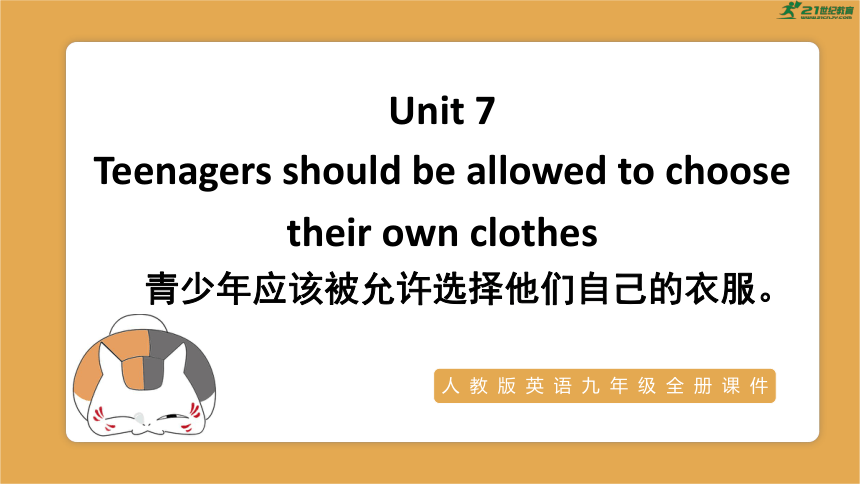 | |
| 格式 | pptx | ||
| 文件大小 | 1.1MB | ||
| 资源类型 | 试卷 | ||
| 版本资源 | 人教新目标(Go for it)版 | ||
| 科目 | 英语 | ||
| 更新时间 | 2023-12-12 10:43:48 | ||
图片预览


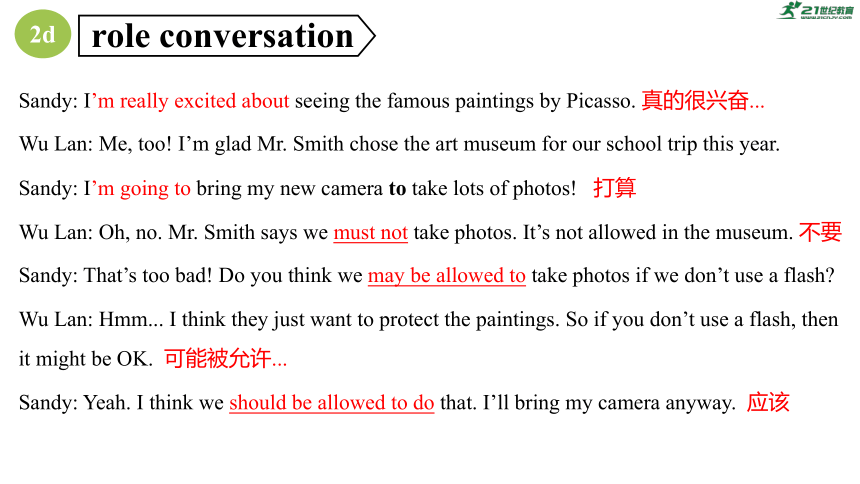
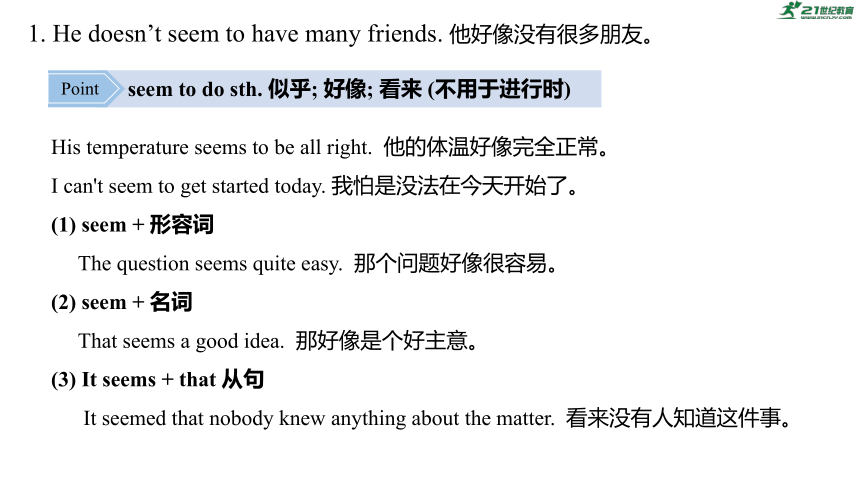

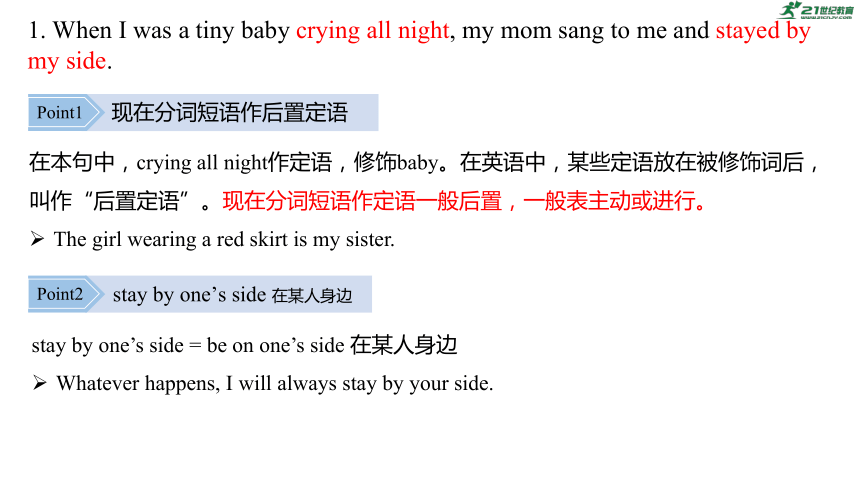
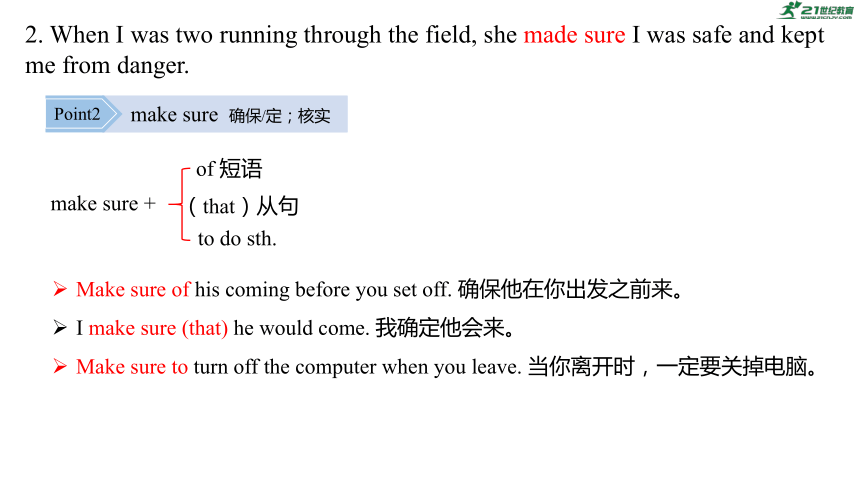
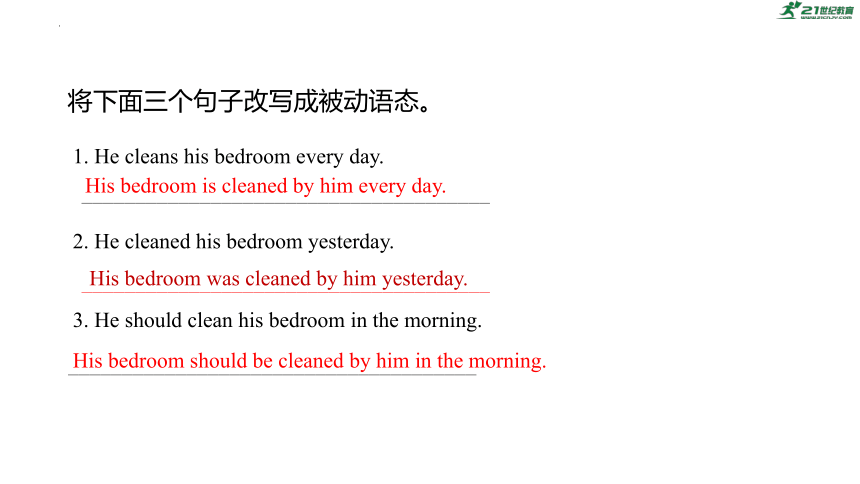
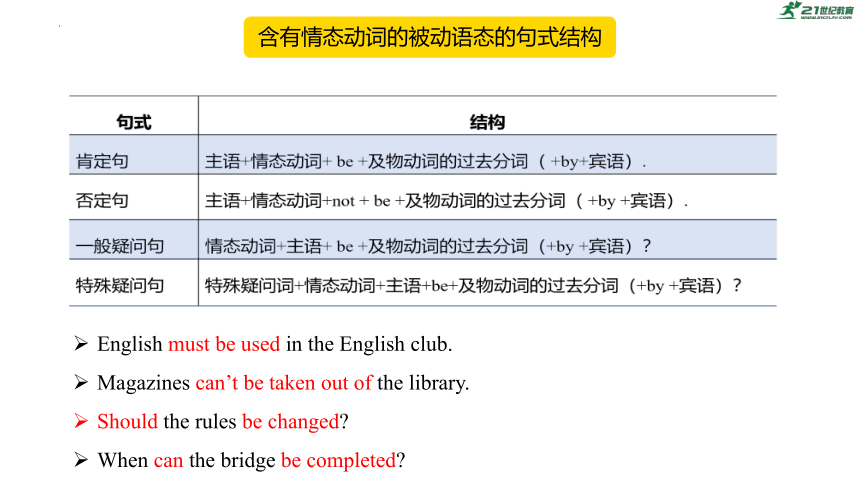
文档简介
(共25张PPT)
人教版英语九年级全册课件
Unit 7
Teenagers should be allowed to choose their own clothes
青少年应该被允许选择他们自己的衣服。
1. be allowed to do 被允许去做 (v.允许; 准许=permit)
2. no way 没门; 不行; 决不
3. driver’s license 驾驶执照
4. sixteen-year-olds 16岁的孩子 = sixteen–year-old kids
5. be worried about your safety 担心你们的安全
6. part-time jobs 兼职工作
7. get their ears pierced 打耳洞
8. make sure 确保
9. serious enough 足够严肃/谨慎/认真
1b
key phrases
Sandy: I’m really excited about seeing the famous paintings by Picasso. 真的很兴奋...
Wu Lan: Me, too! I’m glad Mr. Smith chose the art museum for our school trip this year.
Sandy: I’m going to bring my new camera to take lots of photos! 打算
Wu Lan: Oh, no. Mr. Smith says we must not take photos. It’s not allowed in the museum. 不要
Sandy: That’s too bad! Do you think we may be allowed to take photos if we don’t use a flash
Wu Lan: Hmm... I think they just want to protect the paintings. So if you don’t use a flash, then it might be OK. 可能被允许...
Sandy: Yeah. I think we should be allowed to do that. I’ll bring my camera anyway. 应该
2d
role conversation
1. He doesn’t seem to have many friends. 他好像没有很多朋友。
seem to do sth. 似乎; 好像; 看来 (不用于进行时)
Point
His temperature seems to be all right. 他的体温好像完全正常。
I can't seem to get started today. 我怕是没法在今天开始了。
(1) seem + 形容词
The question seems quite easy. 那个问题好像很容易。
(2) seem + 名词
That seems a good idea. 那好像是个好主意。
(3) It seems + that 从句
It seemed that nobody knew anything about the matter. 看来没有人知道这件事。
When I was a tiny baby crying all night, my mom sang to me and stayed by my side. 在我身旁
When I was tired and hungry, she gave me food and warm arms to sleep in.
When I was two running through the field, she made sure I was safe and kept me from danger.
When I fell and hurt myself, she gave me a hug and lifted me up. 扶我起来
When I was seven coughing badly, she said no ice-cream for me.
But I talked back loudly, “I should be allowed to eat some! Give it to me now!”
When I was nine watching scary movies, she said it’d give me awful dreams. 让我做噩梦的
But I shouted back angrily, “I should be allowed to watch it! I’m not a baby!” 愤怒地吼道
When I was a teen going out with friends, she said, “Please be back by ten!”
But I talked back again — “I should not be told what to do! I’m seventeen now!”
Now I’m an adult, thinking back to those times. 回想起 时光; 时代
I coughed for days after eating that ice-cream And had scary dreams after watching that film.
I was late for school from staying out past ten. I regret talking back, not listening to Mom. Mom knows best, and for me she wanted only the best!
3a
Mom Knows Best
1. When I was a tiny baby crying all night, my mom sang to me and stayed by my side.
现在分词短语作后置定语
Point1
在本句中,crying all night作定语,修饰baby。在英语中,某些定语放在被修饰词后,叫作“后置定语”。现在分词短语作定语一般后置,一般表主动或进行。
The girl wearing a red skirt is my sister.
stay by one’s side 在某人身边
Point2
stay by one’s side = be on one’s side 在某人身边
Whatever happens, I will always stay by your side.
2. When I was two running through the field, she made sure I was safe and kept me from danger.
make sure 确保/定;核实
Point2
Make sure of his coming before you set off. 确保他在你出发之前来。
I make sure (that) he would come. 我确定他会来。
Make sure to turn off the computer when you leave. 当你离开时,一定要关掉电脑。
make sure +
of 短语
(that)从句
to do sth.
将下面三个句子改写成被动语态。
1. He cleans his bedroom every day.
2. He cleaned his bedroom yesterday.
3. He should clean his bedroom in the morning.
______________________________________
His bedroom is cleaned by him every day.
His bedroom was cleaned by him yesterday.
______________________________________
______________________________________
His bedroom should be cleaned by him in the morning.
English must be used in the English club.
Magazines can’t be taken out of the library.
Should the rules be changed
When can the bridge be completed
含有情态动词的被动语态的句式结构
Exercises
— How often do I need to feed the dog
— It _____ food every day, or it will be hungry.
A. must give B. must be give C. must gave D. must be given
2. Our teachers _____ us and they _______ their work very much.
A. be strict with; are strict in B. are strict in; be strict with 对某人要求严格
C. are strict with; are strict in/about 在某方面严格要求 D. are strict in; are strict with
3. — Tom is always careless with his schoolwork. Could you help him
— No problem. I think he _____ to think twice before starting.
A. should be told B. can tell C. should tell D. can be telling
— Mrs. Brown, how long can books from the school library _____
— At most two weeks.
A. borrow B. keep C. be borrowed D. be kept
一、单选
D
C
A
D
The room must be cleaned today.(改为一般疑问句)
______ the room ____ __________ today
This kind of plant can be watered every day.(改为否定句)
This kind of plant ______ _____ _________ every day.
3. Teenagers shouldn’t be allowed to get their ears pierced. (对画线部分提问)
______ __________ teenagers ______ allowed ____ ____
Must be cleaned
二、根据要求做题
can’t be watered
What shouldn’t be to do
Grammar Focus
Fill in the blanks with the correct forms of the words in brackets.
Should teenagers __________ (ask) to move out when they start working In many
Western countries, teenagers _____________ (allow) to move out at eighteen. Their parents believe that they should be educated to take care of themselves from a young age. This way, when they _________ (start) working they can manage their own lives. However, in most Asian societies, it is not common for teenagers to ________ (move) out. Chinese parents believe that it is better for children to live with parents who can _________ (take) care of them. But the young should then look after their parents
as they get older. That is why many Chinese adults ______________ (continue) to live
with their parents.
4b
be asked
are allowed
start
move
take
continue
manage v. 完成(困难的事);应付 (困难局面)
Summary
Many teenagers have hobbies. But sometimes these can get in the way of their schoolwork, and parents might worry about their success at school. Teenagers often think they should be allowed to practice their hobbies as much as they want. Do you agree
Liu Yu, a fifteen-year-old boy from Shandong, is a running star. He is on his school team and has always wanted to be a professional runner when he grows up. However, his parents won’t allow him to train so much. “Of course we want to see him achieve his dreams,” says Mr. Liu. “And we know how much he loves running. My wife and I have supported every one of his races. We have nothing against running! But we think our son needs to think about other possible jobs. =fulfill/realize/come true
He’s getting older now, so he needs to think about what will happen if he doesn’t end up a professional runner.” Liu Yu doesn’t really agree. “Well, I think I should be allowed to decide for myself,” he says. “My parents have always taught me how important it is to work hard at school and enter university. I understand this, but I’m serious about running. It’s the only thing (that) I’ve ever wanted to do.”
His parents believe that Liu Yu should study hard in the evenings so they don’t allow him to practice running at night. “Maybe he thinks it’s too strict or unfair,” says Mrs. Liu. “But we think we’re doing the right thing. He needs to spend more time on his homework because becoming a professional sports star is a difficult dream.” But Liu Yu still disagrees. “I know my parents care about me. They always talk about what will happen if I don’t succeed. But I will! I’m a quick runner! I think I should be allowed to make this choice myself. Only then will I have a chance to achieve my dream.”
2b
Should I Be Allowed to Make My Own Decisions
= be in the way of ... = be in one’s way
Playing computer games can get in the way of your study. 电脑游戏会影响他的学习。
Don’t stand at the door. You’re in my way. 不要站在门口, 你挡到我的路。
1. But sometimes these can get in the way of their schoolwork, and parents might worry about their success at school.
get in the way of 挡...... 的路;妨碍
Point
success n.[U]成功; 胜利; 发财 +in [C]成功的人/事物
Point
be a great/big success 取得极大的成功
Confidence is the key to success. 信心是成功的关键。
He was determined to make a success of the business. 他决心把这门生意做红火。
successful adj.达到目的; 有成效的; 获得成功的/有成就的
successfully adv.顺利地; 成功地
succeed v.达到目的/实现目标/做成; 有作为/成就 succeed in doing sth. 做某事很成功
(1)support v.支持; 养活,赡养;资助,赞助
support sb. /sth. (in... ) (在......方面)支持某人/某事
Whatever you do, I will support you forever.
Several major companies are supporting the project.
In order to support his family, he had to work hard. 为了养家,他不得不努力工作。
(2)support n.[U]支持; 帮助; 资助; 依据 [C]支柱; 支座; 支撑
in support of sb./sth. 支持/拥护...
We’re very thankful for your support.
When my father died, Jim was a real support. 我父亲死后,吉姆成了真正的顶梁柱。
2. My wife and I have supported every one of his races.
support /s p :(r)t/ v. & n. 支持
Point
I have nothing against homework, but I don’t want to do so much homework.
They had nothing against the plan, but they said money was a problem.
他们对该计划没意见, 只是钱是个问题。
against 作介词,在此处意为“反对”,其反义词是for。
be against (doing) sth. 反对(做)某事。
be for (doing) sth. 支持(做)某事。
We are against cutting down too many trees.
Are you for or against the proposal 你支持还是反对这个建议?
I'm all for people having fun. 我完全赞成人们尽情享乐。
3. We have nothing against running!
have nothing against ( doing) sth. 不反对; 对…没意见
Point
enter(1)进来;进去 = go/ come into。enter university 考上大学。
As soon as he entered the room, he knew there was something wrong. 他一进...就...
I believe I will enter a good high school this year if I try hard.
(2)参加; 加入 enter into 加入(讨论)
Linda will enter a writing competition. 琳达将会参加一场写作比赛。
entry / entri/ n.入口; 参与/加入(的权利/机会)+to/into; 词条+in; 参赛(作品); 登记/录入
Entry to the museum is free. 这座博物馆免费参观。
entrance / entr ns/ n.入口; 进入许可; 卷入+into; 进入/出场
Let’s meet at the entrance of the cinema. 让我们在电影院门口见吧。
4. My parents have always taught me how important it is to work hard at school and enter university.
enter / ent (r)/ v. 进来; 进去
Point
choice n. [C]选择; 挑选
choose v. 选择; 挑选; 选取
make a choice 做出选择
have no choice but to do sth. 除了做某事外别无选择; 只好...
It is important for us to make a wise choice of using smartphones.
What influenced you when you made your choice 当你做选择时你受了什么影响?
I have run out of my money. I have no choice but to walk home!
He has no choice but to go with them. 他别无选择,只好跟他们去。
5. I think I should be allowed to make this choice myself.
choice /t s/ n. 选择; 挑选
Point
正常语序是I will have a chance to achieve my dream only then. ( 但由于与前文的连贯性及强调的需要,only then被置于句首。英文句子多是主语在前,谓语在后。) 有时由于修辞或句子结构上的需要,谓语被部分或完全置于主语之前,构成“倒装语序”。
only + 副词/介词短语/状语从句时,句子应部分倒装,即把助动词、情态动词放在主语前。例如:
______ yesterday _____ he find out that his watch was lost.
直到昨天他才发现他的手表丢了。
1.只有到那儿以后,你才能见到他。
.
2.只有通过赚取足够的钱,你才能上大学。
6. Only then will I have a chance to achieve my dream.
only+adv/介词短语/状语从句置于句首,部分倒装
Point
Only
Only after you get there can you see him.
did
Only by making enough money, can you go to college.
其他知识点
be serious about sth. 对.....认真 = take sth. seriously
You must be serious about your P. E. training. = You must take your P. E. training seriously.
复合形容词:基数词-单数名词-形容词 / 基数词-单数名词
This is a three-year-old building. 这是一座有3年之久的建筑物。
We will have a four-hour meeting. 我们将有一个历时四小时的会议。
how long多长时间;how often多久;how many time多久一次;how soon 多久以后
使役动词 make/let/have + 宾语 + 不带to的不定式做宾补;let/have不用于被动语态
She often makes her brother cry, but she was made to cry by her brother this morning.
-There is something wrong with my bike. I will have it repaired tomorrow. 使...被...
-Whay not have Uncle Li repair it 让某人做某事
common adj. 普通的; 常见的(无特殊之处, 大多数人或事物所具有的的)
common sense 常识 common problem 常见问题; 通病
ordinary adj. 平常的; 平凡的(合乎常规的并不特殊的) ordinary-looking 相貌平常的
usual adj. 惯常的; 通常的(强调一惯性的、习惯性的) as usual 像往常一样; 照例
frequent adj. 频繁的; 经常性的(强调间歇很短的发生或出现)
have enough + 名词 + to do sth. 有足够多的...去做某事
I have enough courage to overcome the difficulty.
be + adj./adv. enough to do sth. 足够...去做某事
He is old enough to go to school.
be strict with 对某人要求严格; be strict in/about 在某方面严格要求
sb. + spend + 时间/金钱 + on sth./ (in) doing sth. 做...花了某人...
It takes sb. + 时间 + to do sth.
sth. + cost + 时间/金钱/精力, 无被动语态
pay sb. + 金钱 + for sth. 付钱给某人买... pay for sth./sb. 付...的钱/替某人付钱
Exercises
二、单选
— Jerry looks so tired. He works too hard.
— He has to ______ a family of four on his own. 独立地;独自地 of one’s own 自己的
A. offer B. support C. provide D. remain
2. — It’s a clever ________ to wear the pink tie. It matches your shirt well.
— Thank you very much.
A. offer B. change C. chance D. choice
3. Our class are much sure to win the basketball game ________ Class Three.
A. of B. in C. against D. from
— Do you mean you will join the club
— Yes, I am ______ it.
A. nervous about B. tired of C. serious about D. worried about
D
B
C
C
Summary
人教版英语九年级全册课件
Unit 7
Teenagers should be allowed to choose their own clothes
青少年应该被允许选择他们自己的衣服。
1. be allowed to do 被允许去做 (v.允许; 准许=permit)
2. no way 没门; 不行; 决不
3. driver’s license 驾驶执照
4. sixteen-year-olds 16岁的孩子 = sixteen–year-old kids
5. be worried about your safety 担心你们的安全
6. part-time jobs 兼职工作
7. get their ears pierced 打耳洞
8. make sure 确保
9. serious enough 足够严肃/谨慎/认真
1b
key phrases
Sandy: I’m really excited about seeing the famous paintings by Picasso. 真的很兴奋...
Wu Lan: Me, too! I’m glad Mr. Smith chose the art museum for our school trip this year.
Sandy: I’m going to bring my new camera to take lots of photos! 打算
Wu Lan: Oh, no. Mr. Smith says we must not take photos. It’s not allowed in the museum. 不要
Sandy: That’s too bad! Do you think we may be allowed to take photos if we don’t use a flash
Wu Lan: Hmm... I think they just want to protect the paintings. So if you don’t use a flash, then it might be OK. 可能被允许...
Sandy: Yeah. I think we should be allowed to do that. I’ll bring my camera anyway. 应该
2d
role conversation
1. He doesn’t seem to have many friends. 他好像没有很多朋友。
seem to do sth. 似乎; 好像; 看来 (不用于进行时)
Point
His temperature seems to be all right. 他的体温好像完全正常。
I can't seem to get started today. 我怕是没法在今天开始了。
(1) seem + 形容词
The question seems quite easy. 那个问题好像很容易。
(2) seem + 名词
That seems a good idea. 那好像是个好主意。
(3) It seems + that 从句
It seemed that nobody knew anything about the matter. 看来没有人知道这件事。
When I was a tiny baby crying all night, my mom sang to me and stayed by my side. 在我身旁
When I was tired and hungry, she gave me food and warm arms to sleep in.
When I was two running through the field, she made sure I was safe and kept me from danger.
When I fell and hurt myself, she gave me a hug and lifted me up. 扶我起来
When I was seven coughing badly, she said no ice-cream for me.
But I talked back loudly, “I should be allowed to eat some! Give it to me now!”
When I was nine watching scary movies, she said it’d give me awful dreams. 让我做噩梦的
But I shouted back angrily, “I should be allowed to watch it! I’m not a baby!” 愤怒地吼道
When I was a teen going out with friends, she said, “Please be back by ten!”
But I talked back again — “I should not be told what to do! I’m seventeen now!”
Now I’m an adult, thinking back to those times. 回想起 时光; 时代
I coughed for days after eating that ice-cream And had scary dreams after watching that film.
I was late for school from staying out past ten. I regret talking back, not listening to Mom. Mom knows best, and for me she wanted only the best!
3a
Mom Knows Best
1. When I was a tiny baby crying all night, my mom sang to me and stayed by my side.
现在分词短语作后置定语
Point1
在本句中,crying all night作定语,修饰baby。在英语中,某些定语放在被修饰词后,叫作“后置定语”。现在分词短语作定语一般后置,一般表主动或进行。
The girl wearing a red skirt is my sister.
stay by one’s side 在某人身边
Point2
stay by one’s side = be on one’s side 在某人身边
Whatever happens, I will always stay by your side.
2. When I was two running through the field, she made sure I was safe and kept me from danger.
make sure 确保/定;核实
Point2
Make sure of his coming before you set off. 确保他在你出发之前来。
I make sure (that) he would come. 我确定他会来。
Make sure to turn off the computer when you leave. 当你离开时,一定要关掉电脑。
make sure +
of 短语
(that)从句
to do sth.
将下面三个句子改写成被动语态。
1. He cleans his bedroom every day.
2. He cleaned his bedroom yesterday.
3. He should clean his bedroom in the morning.
______________________________________
His bedroom is cleaned by him every day.
His bedroom was cleaned by him yesterday.
______________________________________
______________________________________
His bedroom should be cleaned by him in the morning.
English must be used in the English club.
Magazines can’t be taken out of the library.
Should the rules be changed
When can the bridge be completed
含有情态动词的被动语态的句式结构
Exercises
— How often do I need to feed the dog
— It _____ food every day, or it will be hungry.
A. must give B. must be give C. must gave D. must be given
2. Our teachers _____ us and they _______ their work very much.
A. be strict with; are strict in B. are strict in; be strict with 对某人要求严格
C. are strict with; are strict in/about 在某方面严格要求 D. are strict in; are strict with
3. — Tom is always careless with his schoolwork. Could you help him
— No problem. I think he _____ to think twice before starting.
A. should be told B. can tell C. should tell D. can be telling
— Mrs. Brown, how long can books from the school library _____
— At most two weeks.
A. borrow B. keep C. be borrowed D. be kept
一、单选
D
C
A
D
The room must be cleaned today.(改为一般疑问句)
______ the room ____ __________ today
This kind of plant can be watered every day.(改为否定句)
This kind of plant ______ _____ _________ every day.
3. Teenagers shouldn’t be allowed to get their ears pierced. (对画线部分提问)
______ __________ teenagers ______ allowed ____ ____
Must be cleaned
二、根据要求做题
can’t be watered
What shouldn’t be to do
Grammar Focus
Fill in the blanks with the correct forms of the words in brackets.
Should teenagers __________ (ask) to move out when they start working In many
Western countries, teenagers _____________ (allow) to move out at eighteen. Their parents believe that they should be educated to take care of themselves from a young age. This way, when they _________ (start) working they can manage their own lives. However, in most Asian societies, it is not common for teenagers to ________ (move) out. Chinese parents believe that it is better for children to live with parents who can _________ (take) care of them. But the young should then look after their parents
as they get older. That is why many Chinese adults ______________ (continue) to live
with their parents.
4b
be asked
are allowed
start
move
take
continue
manage v. 完成(困难的事);应付 (困难局面)
Summary
Many teenagers have hobbies. But sometimes these can get in the way of their schoolwork, and parents might worry about their success at school. Teenagers often think they should be allowed to practice their hobbies as much as they want. Do you agree
Liu Yu, a fifteen-year-old boy from Shandong, is a running star. He is on his school team and has always wanted to be a professional runner when he grows up. However, his parents won’t allow him to train so much. “Of course we want to see him achieve his dreams,” says Mr. Liu. “And we know how much he loves running. My wife and I have supported every one of his races. We have nothing against running! But we think our son needs to think about other possible jobs. =fulfill/realize/come true
He’s getting older now, so he needs to think about what will happen if he doesn’t end up a professional runner.” Liu Yu doesn’t really agree. “Well, I think I should be allowed to decide for myself,” he says. “My parents have always taught me how important it is to work hard at school and enter university. I understand this, but I’m serious about running. It’s the only thing (that) I’ve ever wanted to do.”
His parents believe that Liu Yu should study hard in the evenings so they don’t allow him to practice running at night. “Maybe he thinks it’s too strict or unfair,” says Mrs. Liu. “But we think we’re doing the right thing. He needs to spend more time on his homework because becoming a professional sports star is a difficult dream.” But Liu Yu still disagrees. “I know my parents care about me. They always talk about what will happen if I don’t succeed. But I will! I’m a quick runner! I think I should be allowed to make this choice myself. Only then will I have a chance to achieve my dream.”
2b
Should I Be Allowed to Make My Own Decisions
= be in the way of ... = be in one’s way
Playing computer games can get in the way of your study. 电脑游戏会影响他的学习。
Don’t stand at the door. You’re in my way. 不要站在门口, 你挡到我的路。
1. But sometimes these can get in the way of their schoolwork, and parents might worry about their success at school.
get in the way of 挡...... 的路;妨碍
Point
success n.[U]成功; 胜利; 发财 +in [C]成功的人/事物
Point
be a great/big success 取得极大的成功
Confidence is the key to success. 信心是成功的关键。
He was determined to make a success of the business. 他决心把这门生意做红火。
successful adj.达到目的; 有成效的; 获得成功的/有成就的
successfully adv.顺利地; 成功地
succeed v.达到目的/实现目标/做成; 有作为/成就 succeed in doing sth. 做某事很成功
(1)support v.支持; 养活,赡养;资助,赞助
support sb. /sth. (in... ) (在......方面)支持某人/某事
Whatever you do, I will support you forever.
Several major companies are supporting the project.
In order to support his family, he had to work hard. 为了养家,他不得不努力工作。
(2)support n.[U]支持; 帮助; 资助; 依据 [C]支柱; 支座; 支撑
in support of sb./sth. 支持/拥护...
We’re very thankful for your support.
When my father died, Jim was a real support. 我父亲死后,吉姆成了真正的顶梁柱。
2. My wife and I have supported every one of his races.
support /s p :(r)t/ v. & n. 支持
Point
I have nothing against homework, but I don’t want to do so much homework.
They had nothing against the plan, but they said money was a problem.
他们对该计划没意见, 只是钱是个问题。
against 作介词,在此处意为“反对”,其反义词是for。
be against (doing) sth. 反对(做)某事。
be for (doing) sth. 支持(做)某事。
We are against cutting down too many trees.
Are you for or against the proposal 你支持还是反对这个建议?
I'm all for people having fun. 我完全赞成人们尽情享乐。
3. We have nothing against running!
have nothing against ( doing) sth. 不反对; 对…没意见
Point
enter(1)进来;进去 = go/ come into。enter university 考上大学。
As soon as he entered the room, he knew there was something wrong. 他一进...就...
I believe I will enter a good high school this year if I try hard.
(2)参加; 加入 enter into 加入(讨论)
Linda will enter a writing competition. 琳达将会参加一场写作比赛。
entry / entri/ n.入口; 参与/加入(的权利/机会)+to/into; 词条+in; 参赛(作品); 登记/录入
Entry to the museum is free. 这座博物馆免费参观。
entrance / entr ns/ n.入口; 进入许可; 卷入+into; 进入/出场
Let’s meet at the entrance of the cinema. 让我们在电影院门口见吧。
4. My parents have always taught me how important it is to work hard at school and enter university.
enter / ent (r)/ v. 进来; 进去
Point
choice n. [C]选择; 挑选
choose v. 选择; 挑选; 选取
make a choice 做出选择
have no choice but to do sth. 除了做某事外别无选择; 只好...
It is important for us to make a wise choice of using smartphones.
What influenced you when you made your choice 当你做选择时你受了什么影响?
I have run out of my money. I have no choice but to walk home!
He has no choice but to go with them. 他别无选择,只好跟他们去。
5. I think I should be allowed to make this choice myself.
choice /t s/ n. 选择; 挑选
Point
正常语序是I will have a chance to achieve my dream only then. ( 但由于与前文的连贯性及强调的需要,only then被置于句首。英文句子多是主语在前,谓语在后。) 有时由于修辞或句子结构上的需要,谓语被部分或完全置于主语之前,构成“倒装语序”。
only + 副词/介词短语/状语从句时,句子应部分倒装,即把助动词、情态动词放在主语前。例如:
______ yesterday _____ he find out that his watch was lost.
直到昨天他才发现他的手表丢了。
1.只有到那儿以后,你才能见到他。
.
2.只有通过赚取足够的钱,你才能上大学。
6. Only then will I have a chance to achieve my dream.
only+adv/介词短语/状语从句置于句首,部分倒装
Point
Only
Only after you get there can you see him.
did
Only by making enough money, can you go to college.
其他知识点
be serious about sth. 对.....认真 = take sth. seriously
You must be serious about your P. E. training. = You must take your P. E. training seriously.
复合形容词:基数词-单数名词-形容词 / 基数词-单数名词
This is a three-year-old building. 这是一座有3年之久的建筑物。
We will have a four-hour meeting. 我们将有一个历时四小时的会议。
how long多长时间;how often多久;how many time多久一次;how soon 多久以后
使役动词 make/let/have + 宾语 + 不带to的不定式做宾补;let/have不用于被动语态
She often makes her brother cry, but she was made to cry by her brother this morning.
-There is something wrong with my bike. I will have it repaired tomorrow. 使...被...
-Whay not have Uncle Li repair it 让某人做某事
common adj. 普通的; 常见的(无特殊之处, 大多数人或事物所具有的的)
common sense 常识 common problem 常见问题; 通病
ordinary adj. 平常的; 平凡的(合乎常规的并不特殊的) ordinary-looking 相貌平常的
usual adj. 惯常的; 通常的(强调一惯性的、习惯性的) as usual 像往常一样; 照例
frequent adj. 频繁的; 经常性的(强调间歇很短的发生或出现)
have enough + 名词 + to do sth. 有足够多的...去做某事
I have enough courage to overcome the difficulty.
be + adj./adv. enough to do sth. 足够...去做某事
He is old enough to go to school.
be strict with 对某人要求严格; be strict in/about 在某方面严格要求
sb. + spend + 时间/金钱 + on sth./ (in) doing sth. 做...花了某人...
It takes sb. + 时间 + to do sth.
sth. + cost + 时间/金钱/精力, 无被动语态
pay sb. + 金钱 + for sth. 付钱给某人买... pay for sth./sb. 付...的钱/替某人付钱
Exercises
二、单选
— Jerry looks so tired. He works too hard.
— He has to ______ a family of four on his own. 独立地;独自地 of one’s own 自己的
A. offer B. support C. provide D. remain
2. — It’s a clever ________ to wear the pink tie. It matches your shirt well.
— Thank you very much.
A. offer B. change C. chance D. choice
3. Our class are much sure to win the basketball game ________ Class Three.
A. of B. in C. against D. from
— Do you mean you will join the club
— Yes, I am ______ it.
A. nervous about B. tired of C. serious about D. worried about
D
B
C
C
Summary
同课章节目录
- Unit 1 How can we become good learners.
- Section A
- Section B
- Unit 2 I think that mooncakes are delicious!
- Section A
- Section B
- Unit 3 Could you please tell me where the restroom
- Section A
- Section B
- Unit 4 I used to be afraid of the dark.
- Section A
- Section B
- Unit 5 What are the shirts made of?
- Section A
- Section B
- Review of Units 1-5
- Unit 6 When was it invented?
- Section A
- Section B
- Unit 7 Teenagers should be allowed to choose their
- Section A
- Section B
- Unit 8 It must belong to Carla.
- Section A
- Section B
- Unit 9 I like music that I can dance to.
- Section A
- Section B
- Unit 10 You're supposed to shake hands.
- Section A
- Section B
- Review of Units 6-10
- Unit 11 Sad movies make me cry.
- Section A
- Section B
- Unit 12 Life is full of the unexpected
- Section A
- Section B
- Unit 13 We're trying to save the earth!
- Section A
- Section B
- Unit 14 I remember meeting all of you in Grade 7.
- Section A
- Section B
- Review of Units 11-14
